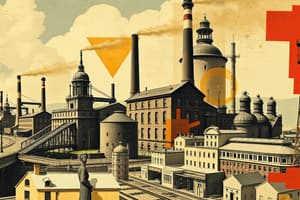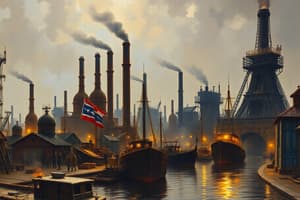Podcast
Questions and Answers
What was a significant change in the role of women during the Industrial Revolution?
What was a significant change in the role of women during the Industrial Revolution?
- Women began to gain more rights and employment opportunities. (correct)
- Women had no influence on social movements during this period.
- Women were expected to remain in domestic roles without societal change.
- Women predominantly worked in rural agriculture.
How did social Darwinism influence attitudes during the Industrial Revolution?
How did social Darwinism influence attitudes during the Industrial Revolution?
- It led to the development of labor unions for fair representation.
- It promoted equal rights for all social classes.
- It discouraged competition among social classes.
- It argued that higher classes were more evolved and deserving of power. (correct)
What concept did the phrase 'survival of the fittest' in the context of the Industrial Revolution primarily relate to?
What concept did the phrase 'survival of the fittest' in the context of the Industrial Revolution primarily relate to?
- The equal opportunity for all individuals in the workplace.
- The need for labor unions to advocate for rights.
- The belief that superior social classes would thrive through competition. (correct)
- The adaptability of cultures to economic changes.
Which of the following best defines capitalism during the Industrial Revolution?
Which of the following best defines capitalism during the Industrial Revolution?
What role did labor unions play during the Industrial Revolution?
What role did labor unions play during the Industrial Revolution?
Which factor primarily contributed to the initiation of the Industrial Revolution?
Which factor primarily contributed to the initiation of the Industrial Revolution?
What was a short-term consequence of the Industrial Revolution?
What was a short-term consequence of the Industrial Revolution?
What long-term impact did the Industrial Revolution have on global economies?
What long-term impact did the Industrial Revolution have on global economies?
In what way did industrialism become a global phenomenon?
In what way did industrialism become a global phenomenon?
What year is often recognized as the beginning of the Industrial Revolution?
What year is often recognized as the beginning of the Industrial Revolution?
Which economic concept is closely associated with the Industrial Revolution?
Which economic concept is closely associated with the Industrial Revolution?
How did labor unions relate to the industrialization process?
How did labor unions relate to the industrialization process?
Which of the following factors was NOT a cause of the Industrial Revolution?
Which of the following factors was NOT a cause of the Industrial Revolution?
Flashcards
Industrial Revolution
Industrial Revolution
A period of rapid technological advancements, particularly in manufacturing and industry, that began in the late 18th century and continued into the 19th century. It involved major shifts in production, transportation, and social structures.
Industrialism
Industrialism
The process of developing and using complex machinery and large factories in the production of goods. It led to mass production and the growth of cities.
Urbanization
Urbanization
The process of people moving from rural, agricultural areas to urban centers, leading to the rapid growth of cities. This occurred during the Industrial Revolution due to job opportunities in factories.
Social Darwinism
Social Darwinism
Signup and view all the flashcards
Women's suffrage
Women's suffrage
Signup and view all the flashcards
What caused the Industrial Revolution?
What caused the Industrial Revolution?
Signup and view all the flashcards
What were the short-term consequences of the Industrial Revolution?
What were the short-term consequences of the Industrial Revolution?
Signup and view all the flashcards
What were the long-term consequences of the Industrial Revolution?
What were the long-term consequences of the Industrial Revolution?
Signup and view all the flashcards
Why was industrialization a global phenomenon?
Why was industrialization a global phenomenon?
Signup and view all the flashcards
Where did the Industrial Revolution begin?
Where did the Industrial Revolution begin?
Signup and view all the flashcards
How did capitalism connect to industrialization?
How did capitalism connect to industrialization?
Signup and view all the flashcards
How did socialism and communism connect to industrialization?
How did socialism and communism connect to industrialization?
Signup and view all the flashcards
How did labor unions connect to industrialization?
How did labor unions connect to industrialization?
Signup and view all the flashcards
Study Notes
General Causes of the Industrial Revolution
- Natural resources and geography
- Labor
- Trade
- Entrepreneurs and inventors
- Politics
- Supply and demand
Short-Term Consequences of the Industrial Revolution
- Child labor
- Poor working conditions
- Untreated human waste
- Deaths and hygiene issues
- Soaring population growth
- Increasing demand for workers
- Changes in farming
- Women's suffrage
- Communication skills
- Technology
- Medical advances
- Transportation
Long-Term Consequences of the Industrial Revolution
- Global phenomenon (not just England) due to cheaper goods, new technologies, increased free time, and a higher standard of living
- Families ate healthier diets, lived in better homes, and lived better lives
- Economic growth led to the rest of the world following suit
- Industrial Revolution started in Britain due to factors of production
Where and When in the Industrial Revolution
- The Industrial Revolution first started in 1712 with the steam engine.
- Started in Britain due to factors of production
Capitalism & Communism
- Laissez-faire economics (free market) is an economic system associated with the success and affordability of goods
- Socialism is when workers control the economy
- Communism is when the government controls the market
Labor Unions
- Formed in the Industrial Revolution to protect workers' rights
- Large groups of workers coming together
Women's Role
- Woman's role changed dramatically during the Industrial Revolution:
- Worked in factories for low pay
- Worked around the home
Social Darwinism
- Claimed those in higher classes, with more money, were more evolved.
- Related to the phrase "survival of the fittest"
- Used to encourage racism
Studying That Suits You
Use AI to generate personalized quizzes and flashcards to suit your learning preferences.




